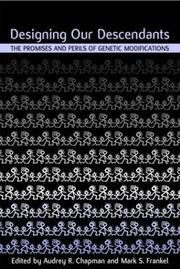| Listing 1 - 9 of 9 |
Sort by
|

ISBN: 1858660793 1858660807 9633865662 Year: 1997 Publisher: Budapest : Central European University Press,
Abstract | Keywords | Export | Availability | Bookmark
 Loading...
Loading...Choose an application
- Reference Manager
- EndNote
- RefWorks (Direct export to RefWorks)

ISBN: 0801872316 Year: 2003 Publisher: Baltimore Johns Hopkins university press
Abstract | Keywords | Export | Availability | Bookmark
 Loading...
Loading...Choose an application
- Reference Manager
- EndNote
- RefWorks (Direct export to RefWorks)
The Human Genome Project, discoveries in molecular biology and new reproductive technologies have advanced our understanding of how genetic science may be used to treat persons with genetic disorders. Greater knowledge may also make possible genetic interventions to "enhance" normal human characteristics, such as height, hair or eye colour, strength, or memory, as well as the transmittal of such modifications to future generations. The prospect of inheritable genetic modifications, or IGMs, whether for therapeutic or enhancement purposes, raises complex scientific, ethical and regulatory issues. This volume presents 20 essays by physicians, scientists, philosophers, theologians, lawyers and policy analysts addressing these issues from diverse perspectives. In three sections, the authors discuss the short- and long-term scientific feasibility of IGM technology; ethical and religious issues related to safety, justice, morality, reproductive rights, and enhancement; and regulatory issues including the necessity of public input and oversight and the influence of commercialization. Their goal is to open a dialogue engaging not only scholars and scientists but also government officials and concerned citizens. The authors conclude that while IGM cannot be carried out safely and responsibly on humans utilizing current methods, it is important to begin public discussion now to determine whether, and if so how, to proceed. The prospect of inheritable genetic modifications for therapeutic or enhancement purposes raises complex scientific, ethical and regulatory issues. These 20 essays, by physicians, lawyers, theologians and others, address these issues from a variety of perspectives.
Bioethical Issues. --- Genetic Engineering. --- Genetic engineering --- Genetic engineering. --- Medical genetics. --- Public policy. --- Government policy --- Moral and ethical aspects. --- menselijk genoom --- gentherapie --- ethiek (ethische aspecten) --- godsdienst (religie, religieuze aspecten) --- génome humain --- thérapie génique --- ethique (aspects ethiques) --- religion (aspects religieux) --- Medical genetics --- Clinical genetics --- Diseases --- Heredity of disease --- Human genetics --- Medical sciences --- Pathology --- Genetic disorders --- Designed genetic change --- Engineering, Genetic --- Gene splicing --- Genetic intervention --- Genetic surgery --- Genetic recombination --- Biotechnology --- Transgenic organisms --- Moral and ethical aspects --- Genetic aspects

ISBN: 0801881293 9780801881299 9780801872310 0801872316 0801872316 Year: 2003 Publisher: Baltimore Johns Hopkins University Press
Abstract | Keywords | Export | Availability | Bookmark
 Loading...
Loading...Choose an application
- Reference Manager
- EndNote
- RefWorks (Direct export to RefWorks)
The authors conclude that while IGM cannot be carried out safely and responsibly on humans utilizing current methods, it is important to begin public discussion now to determine whether, and if so how, to proceed.
Public Policy. --- Bioethical Issues. --- Genetic Engineering. --- Medical genetics. --- Genetic engineering --- Genetic engineering. --- Designed genetic change --- Engineering, Genetic --- Gene splicing --- Genetic intervention --- Genetic surgery --- Genetic recombination --- Biotechnology --- Transgenic organisms --- Clinical genetics --- Diseases --- Heredity of disease --- Human genetics --- Medical sciences --- Pathology --- Genetic disorders --- Government policy --- Moral and ethical aspects. --- Genetic aspects
Book
Abstract | Keywords | Export | Availability | Bookmark
 Loading...
Loading...Choose an application
- Reference Manager
- EndNote
- RefWorks (Direct export to RefWorks)
Book
ISBN: 0871685264 Year: 1994 Publisher: Washington (D.C.): American association for the advancement of science
Abstract | Keywords | Export | Availability | Bookmark
 Loading...
Loading...Choose an application
- Reference Manager
- EndNote
- RefWorks (Direct export to RefWorks)
Medical ethics --- Medical genetics --- Moral and ethical aspects --- Social aspects
Book
ISBN: 1555422969 Year: 1990 Publisher: San Francisco (Calif.): Jossey-Bass
Abstract | Keywords | Export | Availability | Bookmark
 Loading...
Loading...Choose an application
- Reference Manager
- EndNote
- RefWorks (Direct export to RefWorks)
Organizational change --- Personnel management --- Moral and ethical aspects

ISBN: 9781932594041 1932594043 Year: 2004 Publisher: New York (N.Y.) : Dana press,
Abstract | Keywords | Export | Availability | Bookmark
 Loading...
Loading...Choose an application
- Reference Manager
- EndNote
- RefWorks (Direct export to RefWorks)
"A report on an invitational meeting convened by the American Association for the Advancement of Science and the Dana Foundation."
Philosophy of science --- General ethics --- Brain --- Neurosciences --- Neuroscientists --- Imaging. --- Research. --- Legal status, laws, etc. --- Neuroscientifiques --- Cerveau --- Droit --- Législation --- Recherche --- Imagerie
Book

ISBN: 9789633865668 9633865662 Year: 1997 Publisher: Budapest New York
Abstract | Keywords | Export | Availability | Bookmark
 Loading...
Loading...Choose an application
- Reference Manager
- EndNote
- RefWorks (Direct export to RefWorks)
The shift to a market economy in post-communist Eastern Europe has had a profound impact on science and scientists across the region, leading to reforms in research management practices and to drastic cuts in funding levels everywhere. Many countries are moving to a system of competitive research grants awarded on the basis of peer review. The introduction of peer review is not simply a technical matter. It signifies a fundamental change in the social structure of science, enhancing profession-al autonomy and giving working scientists a voice in the allocation of resources. This book combines first-hand accounts of the reform process with analyses of the strengths and weaknesses of both peer review and quantitative indicators.
Research --- Peer review of research grant proposals --- Science --- Science research --- Scientific research --- Information services --- Learning and scholarship --- Methodology --- Research teams --- Grant proposals, Peer review of --- Proposals for research grants, Peer review of --- Research grant proposals, Peer review of --- Review of research grant proposals, Peer --- Research grants --- Evaluation --- Finance --- Central and Eastern Europe, Ethics, Late 20th century, Postcommunism, Ranking, Science policy, US.
Digital

ISBN: 9789633865668 Year: 1997 Publisher: Budapest ;; New York Central European University Press
Abstract | Keywords | Export | Availability | Bookmark
 Loading...
Loading...Choose an application
- Reference Manager
- EndNote
- RefWorks (Direct export to RefWorks)
| Listing 1 - 9 of 9 |
Sort by
|

 Search
Search Feedback
Feedback About UniCat
About UniCat  Help
Help News
News